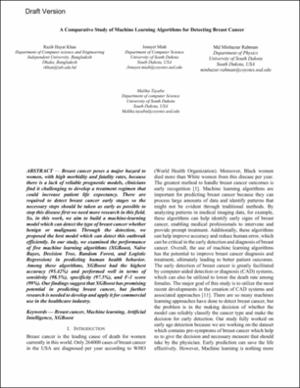| dc.description.abstract | Breast cancer poses a major hazard to women, with high morbidity and fatality rates, because there is a lack of reliable prognostic models, clinicians find it challenging to develop a treatment regimen that could increase patient life expectancy. There are required to detect breast cancer early stages so the necessary steps should be taken as early as possible to stop this disease first we need more research in this field. So, in this work, we aim to build a machine-learning model which can detect the type of breast cancer whether benign or malignant. Through the detection, we proposed the best model which can detect this outbreak efficiently. In our study, we examined the performance of five machine learning algorithms (XGBoost, Naïve Bayes, Decision Tree, Random Forest, and Logistic Regression) in predicting human health behavior. Among these algorithms, XGBoost had the highest accuracy (95.42%) and performed well in terms of sensitivity (98.5%), specificity (97.5%), and F-1 score (99%). Our findings suggest that XGBoost has promising potential in predicting breast cancer, but further research is needed to develop and apply it for commercial use in the healthcare industry. | en_US |
